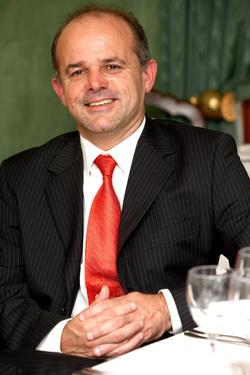The Sub-Saharan Africa hotel industry outlook looks positive, with potential growth of 7 to15 percent in RevPAR (revenue per available room) in 2012.

The Sub-Saharan Africa hotel industry outlook looks positive, with potential growth of 7 to15 percent in RevPAR (revenue per available room) in 2012.
This is a higher figure than 2011 and augurs well for the future of the industry in the region, said Joop Demes, chief executive officer of Pam Golding Hospitality, a member of the Pam Golding Property group.
Speaking at the Africa Property Invest Summit in Sandton Johannesburg earlier this month, Demes said this is almost double the growth anticipated for America and Asia.
According to a recent report by Goldman Sachs, growth in 2012 RevPAR in America and Asia’s hotel industry is forecast at around 5 to 7 percent.
In further contrast, in Europe overall 2012 RevPAR is expected to be flat with a decline of 2 and 4 percent in a number of South European countries such as Italy, Portugal, Spain and Greece, he says.
“Compared with the same trading period in 2011, the South African STR results for July 2012 reflect an overall year to date RevPAR growth of between 9.8 percent for 3-Star hotels up to 12.6 percent for 5-Star hotels.”
Demes said the July year to date occupancy of 57.7 percent in South Africa compares well with America’s forecast of 60 percent in 2012.
Furthermore, in regard to South African hotels, the July 2012 PricewaterhouseCoopers Hospitality Outlook publication forecasts a growth of 14.4 percent in 2012 RevPAR, while also predicting a compound 8.7 percent annual growth rate in RevPAR from 2012 to 2016.
Asked about the key factors driving new growth opportunities in Africa, Demes said growth in RevPAR in the hotel industry, as well as the room pipeline of hotels, is strongly dependent on GDP and employment growth.
“From these statistics one can easily select the African countries that offer growth opportunities – which tend to be the resource rich countries.”
There are, however, also many branding opportunities for existing hotels in Africa.
In America approximately 70 percent of all hotels are branded, while in Africa (other than South Africa) we estimate that some 35 percent or less are branded, and this presents an opportunity for the large and well-known South African and international operators,” he said.

Joop Demes, chief executive officer of Pam Golding Hospitality, a member of the Pam Golding Property group says growth in RevPAR in the hotel industry, as well as the room pipeline of hotels, is strongly dependent on GDP and employment growth.
“Further growth opportunities for the hotel industry in Africa exist in regard to the development of affordable holiday resorts for domestic and regional holidaymakers, including timeshare developments by well established and trusted operators.
Historically and globally, many traditional hotel companies have extended their operations into timeshare, corporate and residential apartments or condominiums. Branching into these markets allows hotel operators some protection from hotel and travel cycles, he said.
Demes pointed out that in 2011, as much as 13 percent of the total turnover of Starwood Hotels – one of the larger global hotel operators – was derived from timeshare related trading.
He says the purchase of timeshare in Africa will not only provide the owner with affordable regional and international exchange and holidays, it can also, if the model is designed properly, provide the owner with the opportunity to make an exchange through points for stays in city hotels.
Current ‘buy-down’ trend among consumers
Demes said that the current ‘buy-down’ trend among consumers in the South African hotel market has been imbalanced by severe discounting.
If we take the achieved average daily rate in South Africa’s hotels and extrapolate this by a compounded rate of 6 percent, and then compare this to what the prevailing rates in 2012 should be, it reveals that on average 5-Star hotels are currently discounting rates by 19.4 percent, 4-Star hotels by 19.9 percent and 3-Star hotels by 12.2 percent. Presently this is impacting negatively on budget hotels, whose customers are poached by higher graded hotels, he explains.
“This trend towards discounting is however, not sustainable as the newer hotels will need to increase rates to service debts.”
He said another trend evident in the local market is that free independent travel is increasing at the cost of standard tour operator business, while globally lead times prior to booking accommodation becoming shorter and shorter.
Importantly, Demes highlighted the fact that due to a number of important factors, certain existing hotels present the opportunity for lucrative acquisitions compared to retail and commercial.
“As mentioned, GDP growth drives the average daily rate and occupancy, as does the low availability of capital for new hotels and low room pipeline (ie fewer additional rooms planned).”
A further positive is that since 2007/8, hotels have been compelled to consider and dramatically increase their operating efficiencies and margins, he said.
“After a number of highly attractive 5-Star hotel transactions, we now have a number of very attractive 3-Star hotel opportunities available with existing yields between 8-12 percent, and at an acquisition price that is about half of replacement value.”
So if one adds to this the above reasons of increased operating efficiencies, declining room pipeline, declining availability of capital for new hotels and forecast GDP and employment growth - as to why we are optimistic about increasing yields in the hotel industry in South Africa - the time is indeed right to consider acquisitions, particularly from a black empowerment point of view, said Demes.
“We also see the opportunity for a real estate investment trust structure that incorporates mid-market hotels spread across borders in a number of African countries,” he added.







